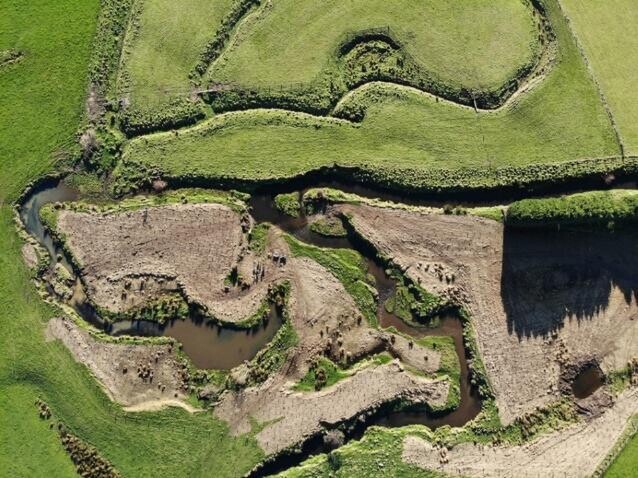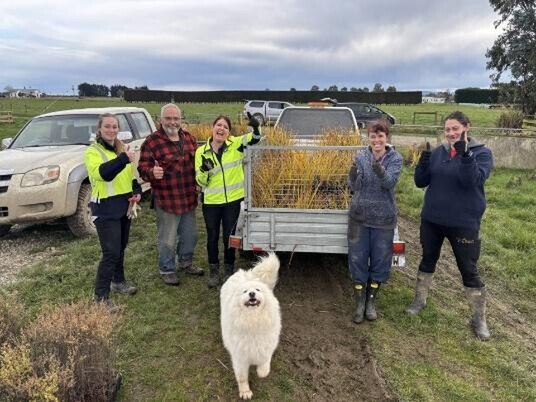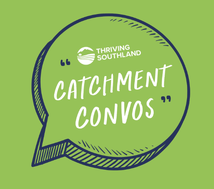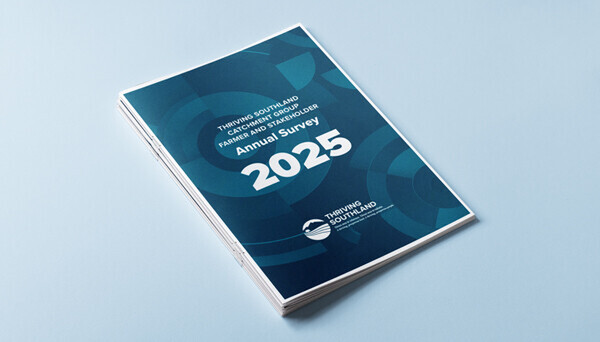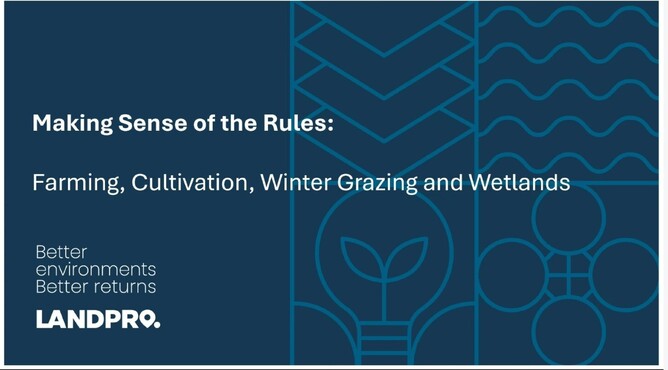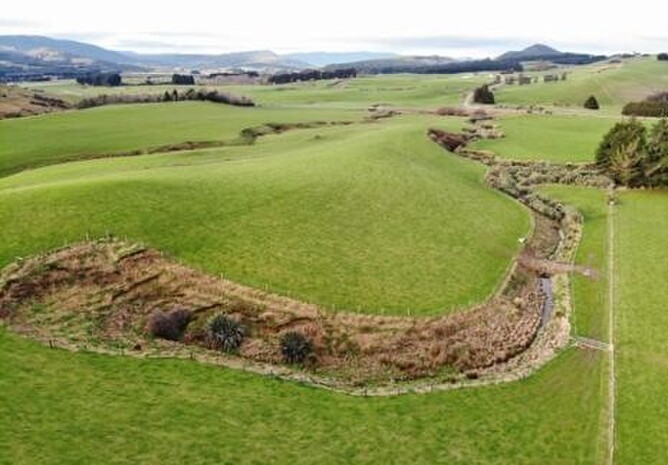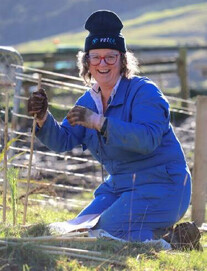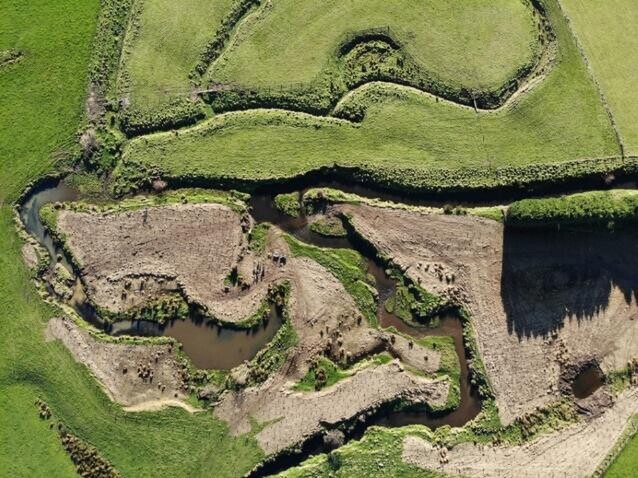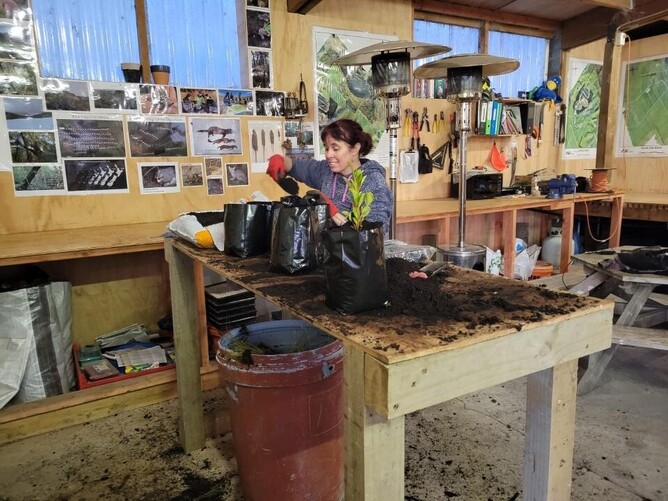It’s been fantastic seeing so many people out and about enjoying planting days, grazing field days and mid-winter catch-ups before lambing and calving kick into top gear.
During the month, I penned an opinion piece in Farmers Weekly talking about the ongoing and increasing roles Catchment Groups are playing around New Zealand. I noted that the Thriving Southland catchment collective model is already providing a place of connection and support for all those engaged in navigating a positive way forward.
Thriving Southland supports 37 Catchment Groups and is the largest collective group in New Zealand. Rooted in collaboration and innovation, this approach demonstrates how localised, community-driven efforts at a catchment level, with funding and support, can address complex environmental and economic challenges more effectively than traditional top-down regulations. By focusing on localised solutions, they bridge the gap between broad scientific research and practical on-farm application, he wrote.
Catchment Groups don’t just tackle water quality, although that’s a core focus. They address the broader picture, recognising that improving water quality is part of a whole-farm systems approach to reducing environmental footprint while maintaining profitability, further linking to market drivers and social licence.
For the full story click here.
It’s been a busy season, and there are a whole host of planting meetings happening right now! To our farmers, good luck for the calving and lambing ahead.
There have been great wintering conditions so far, with kind weather. If you’re looking for a quick reminder on animal welfare rules, check out this MPI resource, and resource on Winter grazing and animal welfare – what’s my role?
A Massive Thank You Te Tapu o Tāne
We want to give a huge thank you to Te Tapu o Tāne for their support, donating native plants to Catchment Groups across Southland this month. It was so exciting to see these plants heading out the gate and into the ground across the region, and was a massive team effort.
If you are keen to find out more about Te Tapu o Tāne - Growing Trees & Communities – click here.
Catchment Convos discusses AI Meets Agriculture: Agri Chat-bots
In this episode of Catchment Convos, host Rachael Halder speaks with Mahgol Yousefi, a product designer and PhD researcher from AgResearch and the University of Canterbury, about the exciting potential of AI-powered chatbots in agriculture.
Mahgol discusses how agri-chatbots could revolutionise farm management by making complex data accessible and actionable for farmers. From simple tasks like summarising reports to advanced applications that can autonomously adjust irrigation systems by integrating weather, soil moisture, and production data, these AI tools promise to transform farming workflows.
The conversation explores current farmer challenges with digital adoption, the importance of building trust through reliable data sources, and how AI could help preserve generational farming knowledge while supporting more sustainable practices. With prototypes already in development and farmer feedback studies planned, this technology represents a significant step toward making farming more efficient and data driven.
Have a listen here.
Southland Farmers Show Growing Optimism and Community Spirit
This year's Thriving Southland survey reveals encouraging trends in farmer wellbeing and community connection. Optimism has surged significantly, with 44% of respondents feeling often optimistic about the future—up from just 32% last year.
Perhaps most telling is the strong spirit of peer support, with over 60% of farmers providing practical assistance to fellow farmers through discussion groups and hands-on help. While farmers continue to prioritise profitability and productivity, there's been a notable shift toward valuing animal health and waste reduction as key goals.
The survey also highlights farmers' desire for ongoing practical support and project funding – something that Thriving Southland will continue to focus on!
You can read the full 2025 survey here.
‘Making Sense of the Rules’ webinar a success
Over 30 people attended the "Making Sense of the Rules" webinar this week, where Landpro’s Christina Railton and Ayla Meikle led an informative session to help participants understand current regulations, rules and regional plans affecting cultivation, winter grazing, and wetlands.
Sediment Mitigations Open Day at Waikawa
The Waikawa Catchment Group had a fantastic Sediment Mitigations Open Day at the end of June. We took people out to the sites, showed what’s been achieved in a short timeframe, and highlighted what this kind of work can look like in practice.
Each site showed a slightly different approach sediment mitigation, including gully retirement and sediment traps, wetland enhancement, rock flow structures, and strategic riparian planting. All were designed to reduce sediment loss, protect waterways, and be a practical fit for working farm systems. The farmers involved talked through their own sites — what triggered the work, how they tackled it, and how it’s tracking so far. It was impressive to see the amount of time and effort put in by farmers and the group, leveraging their funding to maximum effect.
Across the project (Feb–June 2025), farmers delivered:
8,735 native plants in the ground
5,095 metres of fencing
20 sediment control structures
4 wetland areas restored or enhanced
1,290 hours of in-kind labour
A big thanks to everyone who made this project and the field day possible, including the seven farming families - delivering high-quality projects, on short time frames, and, hosting on their sites and sharing their stories, Craig Simpson from Watershed Solutions, for technical design and site support, the Project Manager, Poppy Hardie, MfE for funding and Environment Southland for supporting project delivery. Check out the Thriving website for the story maps.
Mabel Bush & Hedgehope Shared Community Lunch
Before the craziness of calving and lambing kicks in, Hedgehope-Makarewa Catchment Group and Mabel Bush Hall Committee decided to squeeze in a local potluck lunch. It was a great way to catch up with friends and neighbours in the middle of winter. There were lots of great conversations and they came up with a range of ideas, from including getting a Catchment Group sign made to go near the hall and the group’s plantings and having a catch up on a local farm (with a BBQ) to get some deer netting taken down to support the Makarewa Headwater Catchment Group later in the year. They had so much fun, that they forgot to take any photos for this newsletter!
Lower Aparima Winter Grazing and Wetlands Tour
What a fantastic sunny winter day we had! Thanks to everyone who joined us for an inspiring tour across the Lower Aparima catchment. Highlights included, a constructed sediment traps, restoration of an oxbow lake, and a variety of winter grazing methods.
It was a great opportunity to see practical solutions in action and share ideas for sustainable land and water management. Big thanks to all the hosts and participants who made the day so valuable!
Makarewa Headwaters Westpac Success!
Makarewa Headwaters have been focused on their next steps to reduce the impact of large feral pest ungulates (deer, pigs and goats) on their bush and farmland. They’ve just heard that they’ve been successful in getting a Westpac Water Care Grant and Thriving Southland funding to set up plots to monitor the recovery of their native bush alongside their control work.
The Group have lots of ideas, including bringing in great speakers, running stream health and citizen science sessions with local landowners, eDNA tests in seven local streams, and an animal pest workshop. Keep an eye on their Facebook page, Thriving website and this newsletter to find out more.
Wonderful evening with the Ōreti crew!
Each year the Oreti Catchment Groups get together and have a meal and a catch up on what they have been doing and are planning to do. This year was our sixth get together, and there is lots of talking and sharing, and it is very social.
They came up with a great list of trips and events they could do together, including visits to see native planting, restoration and innovative businesses, getting Sam the Trap Man down to do a talk and some foraging on local farm bush blocks.
We really want to repeat last year’s community roadside rubbish pick up “1 km each way” later in the year. Let us know if you are keen to join in with any this.
Waiau Soil Project: Te Anau Basin, Orauea and Lower Waiau
After six months of work across the Waiau, the Soil Project Committee is now reviewing the latest soil management unit outputs from Land and Water Science. It’s very exciting! These insights will soon be ready to be shared, and we hope used by local landowners to improve productivity, profitability, and environmental outcomes.
Follow their Facebook page to find our when they hold their drop-in sessions and the soil insights are available online.
Mid Oreti’s Wetland Work
It’s been a busy month for Mid Oreti. Their Wetland Directory was reprinted, and the latest version is now online. It is full of practical info to inspire and help you feel confident taking the first steps to create your own wetlands, bunds, and sediment traps. You can click here to see it online, or grab a paper copy from Ainsley, Sarah or the Thriving Southland office.
They also brought in Craig Simpson to work with the Winton Stream farmers to use the Group’s online tool which shows where water collects on their farms and suggests where wetlands and sediment bunds could be put (Marshalling the Best Tool). Craig had a great chat with the farmers, looking at their farm on the tool. Then they drove around the farm looking at the wetter areas and discussed a range of options. These went really well, and the Group would like to do more in the future.
Finally, it was a beautiful evening for the July Mid Ōreti drop-in nursery session, with lots of happy broadleaves and kowhai repotted into new bigger pots. The Group were also happy to get some of the plants donated by Te Tapu o Tāne to support local landowners, community groups and schools through their Mid Ōreti Mini Forest Movement Project.
Mini Forest Movement Native Plant Nursery drop-in session
First Tuesday of every month, from 4pm to 6pm
All welcome to come to our monthly native plant growing working-bee evenings at the AB Lime Nursery. Your help will go toward growing plants for the Mid Ōreti Mini Forest Movement Project, which provides native plants to the local community and landowners for their planting projects. Training is provided and all ages welcome! Stay for as little or as long as you like.
Have a great August,
Ngā mihi
Richard Kyte (Thriving Southland Project Lead) and the Thriving Southland Team
